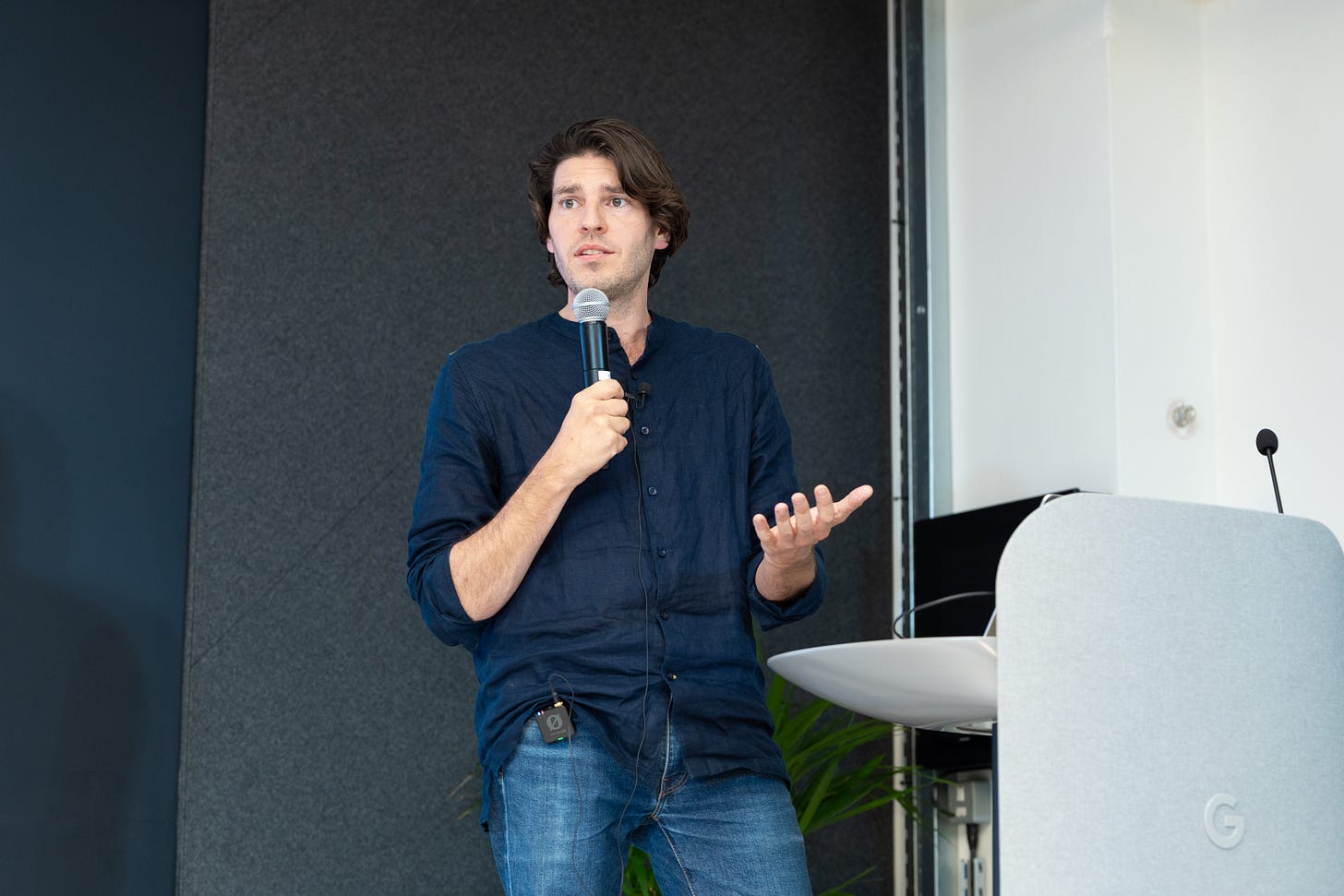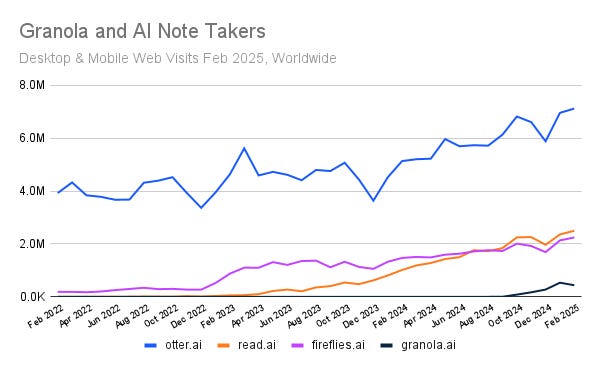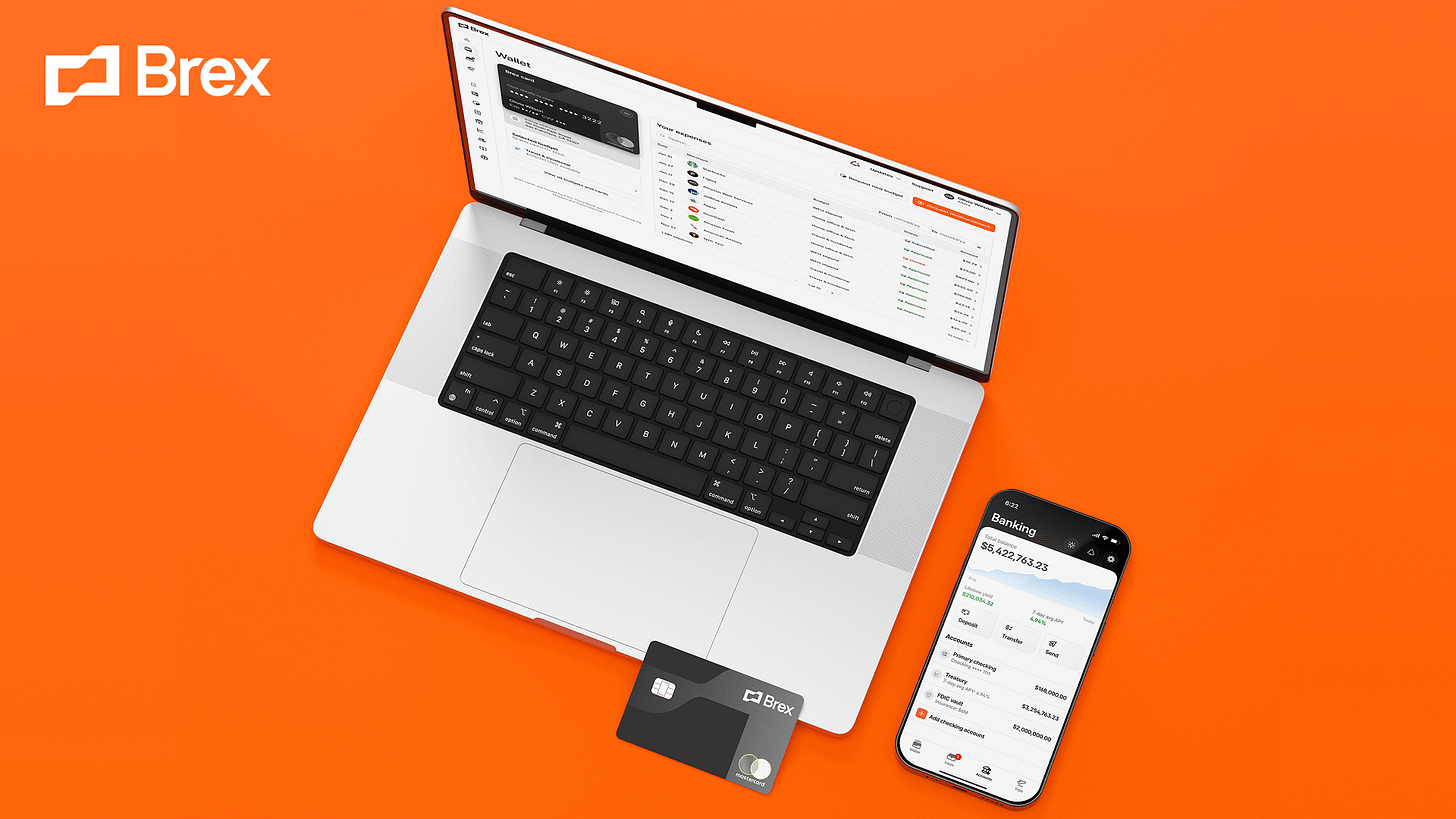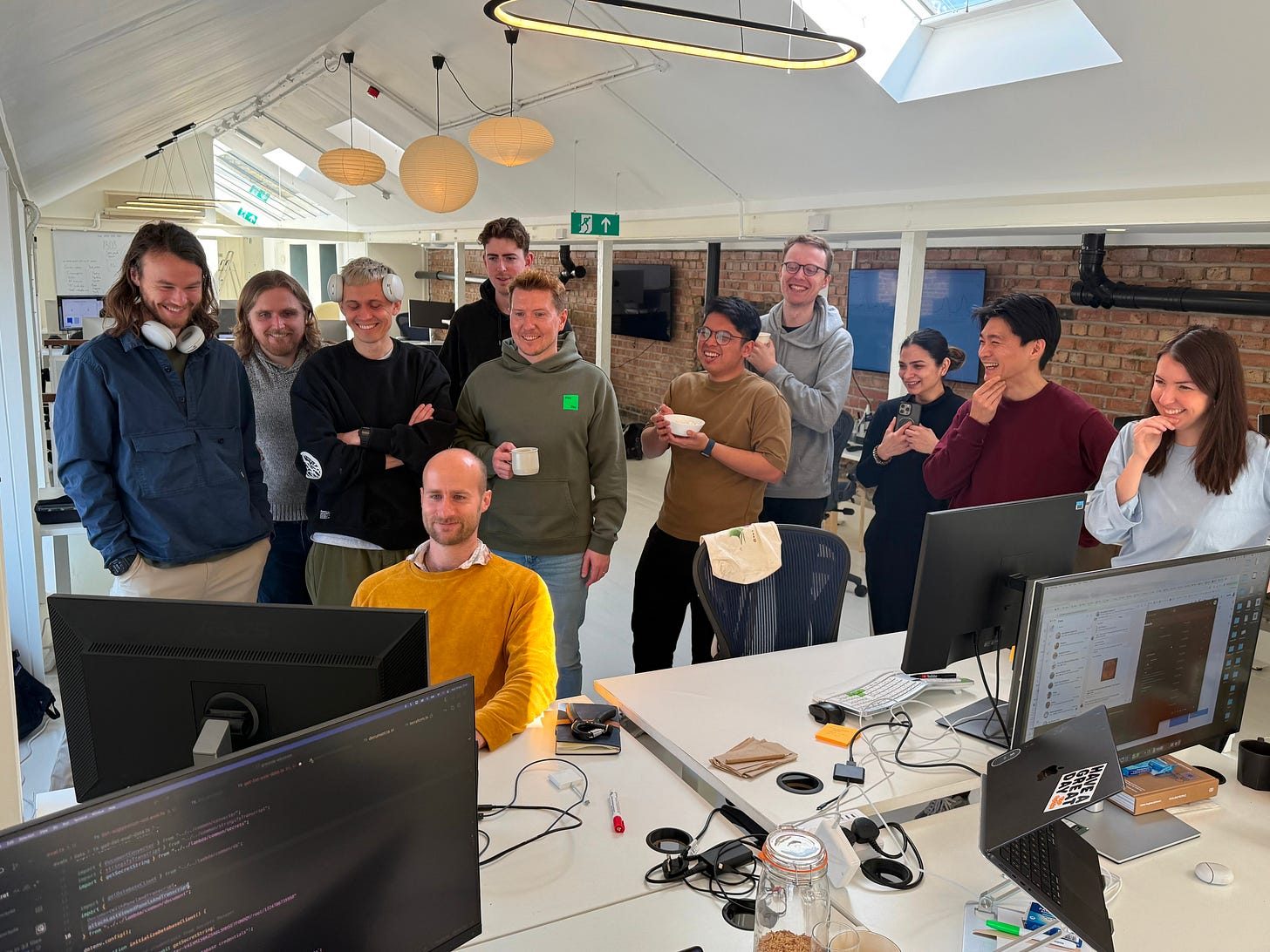Can Granola’s AI meeting notes eat bigger apps for breakfast?
This week's free edition of Upstarts dives into the new note-taking tool that's all the rage with VCs and founders alike.
Upstarts Underway
Welcome to the Upstarts newsletter!
This is Alex Konrad, founder and editor of Upstarts Media. I’m grateful to have you with us for this first edition of our newsletter focused on the startup ecosystem. And a happy Q2 to all who celebrate.
This week we’re kicking off with a startup in a category we wouldn’t have predicted a few weeks ago: note-taking apps. Like us at Upstarts, you might have figured there wasn’t much exciting to say about meeting notes. And — like us until we started using startup Granola a few weeks ago — you’d be wrong.
We first heard about Granola as the latest venture capitalist obsession, used by AI and consumer product aficionados alike. It came up often enough that when Upstarts set out to interview 25+ of you in February for early audience feedback, we downloaded Granola’s desktop app to give it a try.
Within a few meetings, it was easy to understand why Granola, led by two-time founder and CEO Chris Pedregal in London, has been gaining so much attention. Last October, Granola raised a $20 million Series A funding round despite just 5,000 weekly users. That number has grown consistently by 10% each week since, Pedregal says – meaning Granola is still small, but growing fast. (Up to 50,000 users now, by Upstarts’ napkin math.)
By focusing doggedly on the use case his own testers demanded – even in humble note-taking – Pedregal appears to have the momentum to take on better-resourced incumbents. Upstarts interviewed Pedregal and some of Granola’s investors and early users to understand why the startup’s approach has resonated so far. The story’s below.
Programming notice: Join us later today for the first of our Upstarts Live video series, in which we will interview some of the startup ecosystem’s most interesting emerging leaders. We’re starting with Runway CEO Cris Valenzuela, on the heels of Runway’s release of its Gen-4 model pushing the limits of AI video creation, in a race with OpenAI. Watch that on the Substack app at 12pm ET, available to all subscribers and app users. Paid subscribers will get access to the full video in our premium edition on Friday.
Now, on to Granola.
Presented by our Launch Partner, Brex.
Did you know that 1 in 3 startups use Brex for banking and corporate cards? Here's why. Brex has everything you need to extend your runway and move faster. With Brex cards, you get up to 20x higher limits and business-building rewards like billboards, offsites, and cash back. And Brex’s banking solution lets you earn high yield from day one while staying 100% liquid. The best part: Brex’s global platform is designed to scale with you from idea to IPO. Get started in minutes, and never look back at brex.com.
COOKING WITH FIRE
The first thing you notice (or don’t) about using Granola in a meeting: it’s discreet. Users see a blank notepad for jotting down thoughts and a little button with green bars that move when Granola’s transcribing. Other attendees see nothing at all.
If you’re a Granola nerd, the fun begins when the meeting’s over. Granola’s software grabs whatever notes you made and folds them into its own AI-powered summary with bullet points and quotes. Users can reformat the notes to fit specific formats like a hiring meeting or weekly standup outline with a click. In Upstarts Media’s case, a quickly-made custom template creatively called “audience feedback” standardized responses across four main questions around… audience feedback.
Clicking into Granola’s smart notes can pull up more context, or snippets of the meeting transcript. (Granola doesn’t record the audio or video itself, but creates and saves a transcription by making API calls to leading AI models like OpenAI’s GPT-4 and Anthropic’s Claude 3.5 that generate it themselves.) Many users then throw those notes into ChatGPT itself for insights; at the urging of Lux Capital partner Grace Isford, Upstarts flowed its own two-dozen audience call notes into Google’s NotebookLM research tool to create high-level summaries of the aggregate replies.
“I use the Granola product every day, and the beauty is in its thoughtful simplicity,” Isford wrote Upstarts in an email.

For Pedregal, such an experience is fully intentional. A 39-year-old American who moved to London with his English wife and two children two weeks before Covid-19 lockdowns in 2020, Pedregal had just left Google to figure out his next startup idea in 2022 when he was blown away by OpenAI’s release of a new version of its GPT-3 AI model that could understand and execute user instructions. Pedregal’s previous startup, Socratic, had used an early type of AI to help students with homework before Google acquired it to incorporate it into Google Search.
Whatever he built next, Pedregal knew that such AI capabilities would be at its core. “I became convinced very quickly that all the tools we use for knowledge work were going to be reinvented on top of this technology, because it is so powerful,” he said. “It’s a bit like if you discover fire, and now cooking’s not going to be the same.”
Teaming up with designer Sam Stephenson as his cofounder, Pedregal spent months prototyping various work tools with test users to little success. “Their eyes just glazed over for all of them,” he said. The one idea that made their eyes “light up”: notes that could expand in real time.
“We begrudgingly entered into this,” Granola’s CEO told Upstarts. “Another meeting bot was not at all what we started out to do.”
But to build a more ambitious “tool for thought,” they had to start somewhere. Meetings turned out to be catnip for an intentional early test user: VCs. Startup investors take a high volume of meetings weekly; they’re also professionally incentivized to experiment with new tools.
Pedregal and Stephenson didn’t nail the experience right away. One early version of Granola hosted its note-taking in a browser tab that could be easily lost amidst a sea of others; live generation of notes as they happened, meanwhile, could distract the user as they evaluated and critiqued the output instead of focusing on their conversation.
“We worked on Granola for a year before we launched, and it felt like an eternity in this space,” Pedregal said. “It wasn’t there yet, it wasn’t there yet, and then finally it was like, okay, we have the beginning of something that’s useful.”
THE GRANOLA DIET
When Granola publicly launched in May 2024, it immediately attracted early adopters like a16z investor Olivia Moore with the simplicity of its product. “These prosumer products are very hard to get right, but once you do, they can get huge,” she said.
The sense that Granola has good taste – that it’s loyal to its users first, corporate buyers second – has helped it continue to ripple out among tech circles. Last month, when Product Hunt cofounder Ryan Hoover asked his followers on X: “what product has had the biggest impact on your life or work in the last 6 months?” Granola was repeatedly mentioned. On Monday, Hoover posted a follow-up: “Granola is so good.”
Granola’s ideal customer persona isn’t a VC anymore – it’s actually founders now, said Pedregal, as VCs increasingly might be angling to invest in Granola, or flatter its leadership. Founders use the software across a variety of job functions like sales, marketing and operations. It’s penetrated to tech executive recruiting firms, too: at Daversa Partners, president Laura Kinder said she has embraced Granola whereas other note-taking apps felt “intrusive” for confidential recruiting calls. Her use has also helped push 136 of Daversa’s 150 or so employees to use Granola now, keeping up with each other’s meeting notes and sharing takeaways on Slack.
“If I’m in an important conversation with a client, it’s intrusive to have a notetaker bot in there,” said Kinder. “It’s much easier to say, ‘Hey, I’m going to have Granola running in the background, do you mind?’ Then it runs in the background.” (Granola is currently testing a feature that can auto-announce itself at the start of a meeting to receive such consent.)
Granola is still a young product – obviously so at times. When Upstarts told Pedregal we planned to test the tool by transcribing our interview with him, the CEO warned “it’s definitely not perfect” and suggested recording an audio backup. And while its notes were largely impressive in capturing the interview’s most interesting points, Granola left out some of Pedregal’s spiciest comments, and screwed up several specific numbers and proper names, including its own (“Granolah”).
Such issues aren’t unique to Granola – even the much older and larger Otter.ai tool, used by Upstarts as a backup, made similar mistakes (though it does boast audio playback) – but by outsourcing its transcription, Granola is more at the mercy of the ongoing improvement of commercial AI models like GPT and Claude. Pedregal is banking on those tools continuing to get better and cheaper, though Granola may eventually bring more tooling in-house.
Expect that to look more like the analysis and knowledge capture currently made possible by user workaround to ChatGPT and NotebookLM, versus Granola training its own model anytime soon. The company has much more basic issues to address, like PC access – some users supposedly have purchased MacBooks just to have Granola access – and a mobile app that could save at least one VC, whom Pedregal wouldn’t name but told the CEO he currently carries his laptop on walk-and-talk meetings to generate Granola notes.
There’s a lot Granola can do to make itself more accessible, and more valuable. While users can already chat with Granola’s own AI-powered bot to extract answers or transcript snippets for one meeting, Granola plans to make it possible to group meetings together to be queried, so that a user might be able to ask about all meetings on a certain project, or interactions with a particular client. Granola also plans to add integrations and features to take actions from those surfaced insights, such as generating a customer email or drafting marketing copy.
“The first part of the product is trying to figure out how people take notes and how they process them,” said Spark Capital’s Nabeel Hyatt, who led Granola’s Series A funding round. “The next step is to go do something with it.”

Granola’s much larger note-taking rivals won’t sit back and watch. Read AI raised $50 million of its own in October and has a much larger install base (claiming 100,000 new accounts each week), while Fireflies and Otter.ai have raised tens of millions of their own and continue to ship new features themselves. Granola ranks seventh in venture backing within the note-taking app category, per Crunchbase data requested by Upstarts Media, though much of such deal activity took place in the post-Covid remote work boom of 2021 into 2022.
But from his London perch, a bit removed from the FOMO cycle of AI app builders in the Bay Area, Pedregal said he’s focused more on what would work for his own users than what anyone else is building. “There is so much value in choosing a very narrow use case and understanding that user better than they understand themselves,” he said.
Anyway, it’s not any of those startups that Granola is targeting. Pedregal sees his biggest competition as the no-frills, ever-reliable Apple Notes app. “If you talk to users who need to make sure they capture something really important in a meeting, Apple Notes is actually the competitor there,” Granola’s CEO said. “It’s the easiest and fastest thing to get to.”







Love granola. I personally like how discreet it is. It’s so odd to have otter.ai or read.ai in the meeting room as a participant.